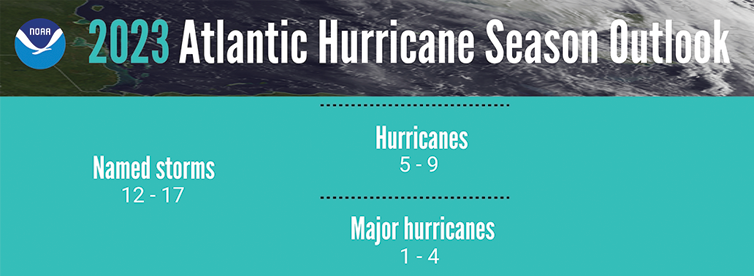We get it: life is hectic, especially in the summer, and it’s understandable if preparing for a hurricane-related emergency feels like it doesn’t fit on your to-do list. But preparing for a hurricane is more manageable than you might think, and making a plan now can help to protect you and your family from serious harm.
Once you have a plan and some supplies in place, it’s much easier to update them and stay safe year after year. Richmond and Henrico Health Districts have all the info you need to be as prepared as possible for the upcoming hurricane season.
When is hurricane season at its peak in Central Virginia?
Hurricane season runs from June 1 to November 30, but the risk of a serious weather event is at its peak in Central Virginia between mid-August and mid-October.
What are the risks for our region?
Central Virginia can experience dangerous flooding, destructive winds, and tornadoes when a hurricane makes landfall. Flooding is the most dangerous risk and can be caused quickly by excessive rainfall. In the high heat of August and September, hurricanes can also cause power outages that expose residents to extreme heat conditions in their own homes.
What are the most important steps to prepare?
Keep your cell phone charged when a hurricane or severe storm is in the forecast.
Consider signing up for Emergency Alerts from the National Weather service.
Put together emergency kits for your home and car.
A supply kit for your home should include:
-
- Water – one gallon of water per person per day for at least three days, for drinking and sanitation
- Food – a three-day supply of non-perishable food
- First aid supplies and medications
- Clothing and bedding
- Tools and emergency supplies
- Important family documents
- Masks and hand sanitizer to protect against COVID-19 if you must leave your home
Store your emergency kit in an area where you can get to it quickly. Put contents in a large, watertight container (e.g. a large plastic garbage can with a lid and wheels) that you can move easily. Make sure everyone in your family knows where to find the emergency kit.
A supply kit for your car should include:
-
- Blankets
- First Aid Kit
- Jumper cables
- Cell phone/charger
- Tool kit
- Water
- Canned or dried foods and a can opener
- Flashlight and extra batteries
- Masks and hand sanitizer to protect against COVID-19
The Virginia Department of Health has a helpful supply checklist available for download to help you prepare.
If you haven’t yet, get your COVID vaccine, and plan to take other steps to protect yourself against COVID in an emergency.
During an evacuation or other serious emergency, you may encounter other community members in a shelter, hospital, or other public setting. Vaccination is the best protection against COVID-19, but the CDC has more detailed guidance about how best to protect yourself against COVID-19 if you must leave your home during a weather emergency.
Make a plan for your pets.
The Virginia Department of Health has a disaster supply checklist specifically for pets and other helpful tips on how to make sure your pet stays safe during an emergency.


